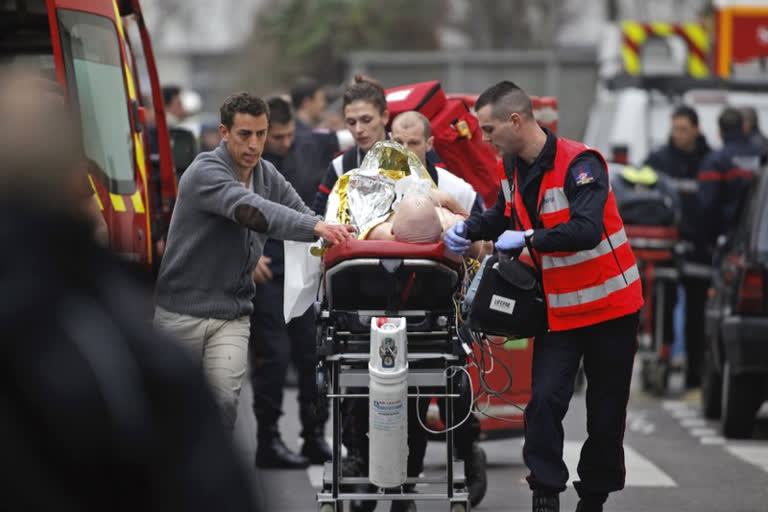Paris:The terrorism trial of 14 people linked to the January 2015 Paris attacks on the satirical weekly Charlie Hebdo and a kosher supermarket ends on Wednesday after three months punctuated by new attacks, a wave of coronavirus infections among the defendants, and devastating testimony bearing witness to three days of bloodshed that shook France.
Three of the 14 fled to Syria just ahead of the Jan. 7-9, 2015 attacks in Paris, which left 17 dead along with the three gunmen — who claimed the killings in the name of al-Qaida and the Islamic State group. The other 11, all men, formed a circle of friends and prison acquaintances who claimed any facilitating they may have done was unwitting or for a more run-of-the-mill crime like armed robbery: weapons stashed in a zipped duffel that few would admit to opening, vehicles, communications, and a short-term rental apartment scouted as a hideout.
One gambled day and night during the three days, learning what happened only after emerging blearily from the casino. Another was a pot-smoking ambulance driver. A third was a childhood friend of the market attacker, who got beaten to a pulp by the latter after going into debt.
It was the coronavirus infection of Ali Riza Polat, described as the lieutenant of the virulently anti-Semitic market attacker, Amédy Coulibaly, that forced the suspension of the trial for a month. Polat, whose profane outbursts and insults drew rebukes from the chief judge, is the only defendant present to face a life term. A handwriting expert testified it was Polat who scrawled a list of arms and munitions — along with their prices — which was linked to the attack.
Read:|Charlie Hebdo, market attacks turned widow into fugitive
The minimum sentence requested by prosecutors is five years, for a suspect who went along to shop for weapons and a car, and watched as his friend removed the GPS tracker from a motorcycle but asked no questions.
Among those testifying were the widows of Chérif and Saïd Kouachi, the brothers who stormed Charlie Hebdo’s offices on Jan. 7, 2015, decimating the newspaper’s editorial staff in what they said was an act of vengeance for its publication of caricatures of the Prophet Muhammad years before. Charlie Hebdo’s offices had been firebombed before and were unmarked, and its editors had round-the-clock protection. But it wasn’t enough.
In all, 12 people died in that attack. The first was Frédéric Boisseau, who worked in maintenance. Then, the Kouachis seized Corinne Rey, a cartoonist who had gone down to smoke, and forced her upstairs to punch in the door code. She watched in horror as they opened fire on the editorial meeting. For years, she harboured paralyzing guilt that her life was spared while so many others died.
“I was not killed, but what happened to me was chilling and I will live with it until my life is over,” she testified. “It took me some time to understand it, but I’m not the guilty one in this. The only guilty ones are the Kouachis and their accomplices.”
The next day, Coulibaly shot and killed a young policewoman after failing to attack a Jewish community centre in the suburb of Montrouge. By then, the Kouachis were on the run and France was paralyzed with fear.
Authorities didn’t link the shooting to the massacre at Charlie Hebdo immediately. They were closing in on the fugitive brothers when the first alerts came of a gunman inside a kosher supermarket. It was a wintry Friday afternoon, and customers were rushing to finish their shopping before the Sabbath when Coulibaly entered, carrying an assault rifle, pistols and explosives. With a GoPro camera fixed to his torso, he methodically fired on an employee and a customer then killed a second customer before ordering a cashier to close the store’s metal blinds, images shown to a hushed courtroom.
The first victim, Yohan Cohen, lay dying on the ground and Coulibaly turned to some 20 hostages in the room and asked if he should “finish him off.” Despite the pleas to leave him alone, Coulibaly fired a killing shot, according to testimony from cashier Zarie Sibony.
